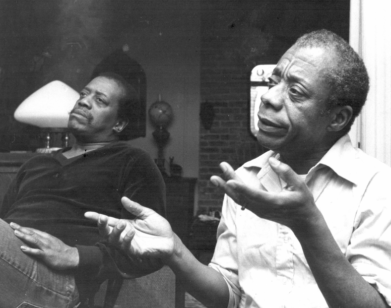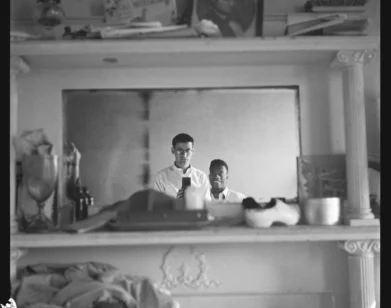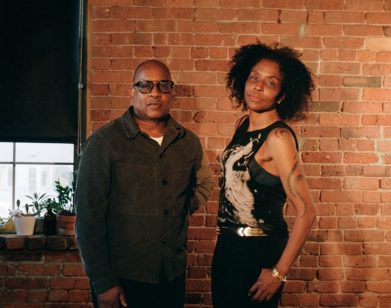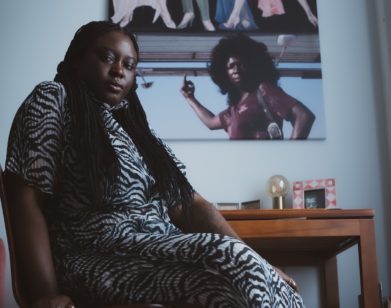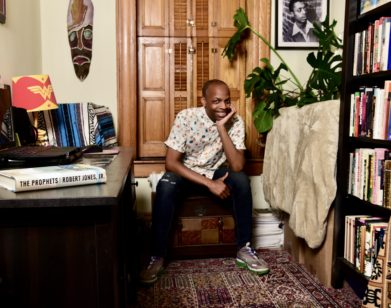rough draft
Sunny Hostin’s New Beach Read Was Inspired by James Baldwin, Toni Morrison, and Sonia Sotomayor
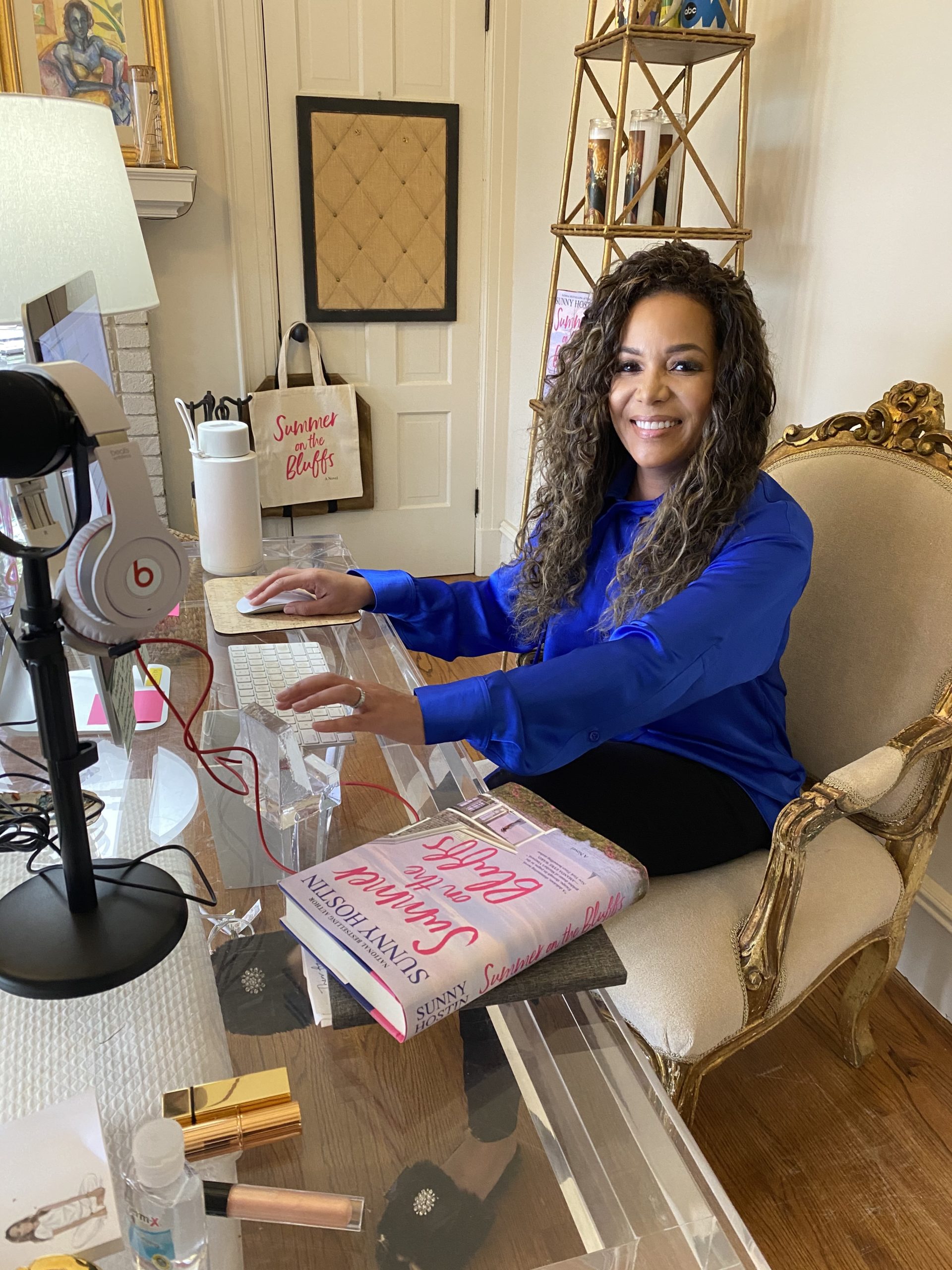
Sunny Hostin at her desk.
This is Rough Draft, in which our favorite writers get to the bottom of their own craft. From preferred writing drinks to whether or not you really need to carry a notebook, we find out all the ways they beat writer’s block and do the work. Before curling up with Summer on the Bluffs, the latest beach read by The View co-host Sunny Hostin, discover all the elements that helped the lawyer and journalist get it done.
———
JULIANA UKIOMOGBE: Describe your ideal writing atmosphere. What gets you in the mood?
SUNNY HOSTIN: I have insomnia, so I often find myself writing late at night. I like to write in my home office, which is my refuge away from the chaos of everyday life with my family. It’s quiet and cozy. It’s where I found the space to collect my thoughts and where I found that the characters and narrative of Summer on the Bluffs were pouring out of me.
UKIOMOGBE: What drinks or snacks do you like to have while you write?
HOSTIN: I don’t snack often. I typically don’t have any food, but I always have my big bottle of water on my desk. I definitely stay hydrated!
UKIOMOGBE: Do you ever smoke or drink while you write?
HOSTIN: I don’t. I love a glass of rosé on the beach after I finish a few chapters, though!
UKIOMOGBE: Do you keep a notebook and/or journal?
HOSTIN: I keep a notepad next to my bed, where I’ll jot thoughts or ideas down when I have trouble sleeping. Some of my best ideas have come in the middle of the night!
UKIOMOGBE: What’s your favorite quote?
HOSTIN: “You can’t live a perfect day without doing something for someone who can’t repay you.” When you have the opportunity to be the champion in the room, you must do it with great rigor.
UKIOMOGBE: Whose writing do you always return to?
HOSTIN: James Baldwin’s writings. I reflect on them often—particularly his text on identity. He said, “You’ve got to tell the world how to treat you. If the world tells you how you are going to be treated, you are in trouble.” I was also so inspired by the way he talks about our country. Baldwin said, “I love America more than any other country in the world and, exactly for this reason, I insist on the right to criticize her perpetually.” Those premises guided me in my writing, both fiction and nonfiction.
UKIOMOGBE: What books did you read as a kid? Have your thoughts about the writers changed?
HOSTIN: I loved mystery books. I obsessed over Nancy Drew as a girl—reading about the cases, deciphering clues, and getting to the bottom of the puzzle at hand. I grew up reading a ton of fiction, and it was always a dream of mine to one day write a novel of my own. I’d say I have an even greater appreciation of the hard work that goes into writing each draft, polishing the language, and seeing the finished product. I am grateful to have the opportunity to create more, and I have some exciting projects on the horizon.
UKIOMOGBE: Do you read while you’re in the process of writing? Which writers inform your current work the most?
HOSTIN: I’m an avid reader. I have a big stack of books beside my bed. I drive my husband crazy because I’ll read more than one book at a time. I loved Isabel Wilkerson’s book Caste; Whistling Vivaldi by Claude Steele; and White Fragility by Robin DiAngelo. The characters in Summer on the Bluffs grapple with many of the issues we are facing in our country today.
UKIOMOGBE: How many drafts of one piece do you typically write?
HOSTIN: I have to say, I write many, many drafts. I’m a bit of a perfectionist so am constantly making changes here and there. With all my books, I was making small tweaks, even at the bitter end—which likely drove my editor nuts!
UKIOMOGBE: Who’s your favorite screenwriter? Can a movie ever be as good as the book?
HOSTIN: I love Shonda Rhimes. I don’t think it’s easy to compare a movie to a book, as they are such different mediums. I appreciate how a filmmaker transforms a text, translates it, and then brings it to life.
UKIOMOGBE: Do you consider writing to be a spiritual practice?
HOSTIN: Writing and reading, in fact, do feel a bit like a spiritual practice. Before the pandemic, I was traveling quite a bit, covering very emotional, heavy stories. Reading light-hearted fiction books—although I love most genres—very much became a method of escapism for me, going to and coming from my coverage across the country. In a similar suit, when I began writing Summer on the Bluffs, it felt like a bit of an escape and a distraction. I was able to immerse myself in this world I was creating, with the characters and the relationships, and shift my mindset.
UKIOMOGBE: Which writers would you choose to have dinner with, living or dead?
HOSTIN: Two writers, in particular, come to mind—both of which were an inspiration for me to write my memoir and now my fiction series. The first is Justice Sonia Sotomayor, who is of course so much more than a writer, but a beautiful one at that! At an event a few years back, the Justice, a fellow Puerto Rican girl from the South Bronx, said to me, “You know, Sunny, you have to write a book telling your story and promise me that when you do, you’ll also publish it in Spanish.” The second would be Toni Morrison. Her quote, “If there’s a book that you want to read, but it hasn’t been written yet, then you must write it,” has always struck me and was really the genesis of Summer on the Bluffs. I saw this clear white space in the beach read genre about, and for, people of color. I knew the story had to be written.
UKIOMOGBE: What advice do you have for people who want to be better writers?
HOSTIN: I would say, take the pressure off of it. It’s a process that took me a bit to learn, but getting ideas on paper (even if not perfect) is a great first step. There is always an opportunity to edit, hone and rewrite, but having a base of your story to look at and internalize makes the process so much less daunting.
UKIOMOGBE: What are some unconventional techniques you stand by?
HOSTIN: For me, it’s more about unconventional places I write. The initial concept and proposal for Summer on the Bluffs actually came to me on a plane and I ferociously scribbled the initial ideas down.
UKIOMOGBE: Can great writing save the world?
HOSTIN: You know, I think writing and storytelling, at that, is certainly a beautiful start. Representation is so important that amplifying marginalized voices and stories is more crucial than ever. As a writer and as a co-host of “The View,” I have this humbling opportunity to do so each day. It’s not a responsibility I take lightly.


